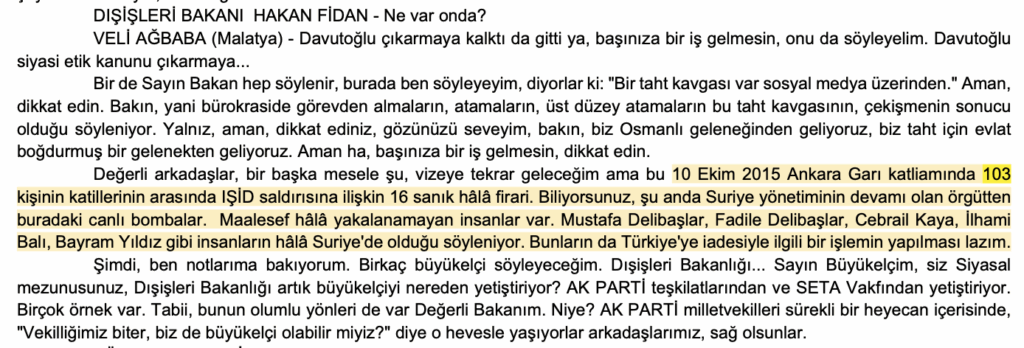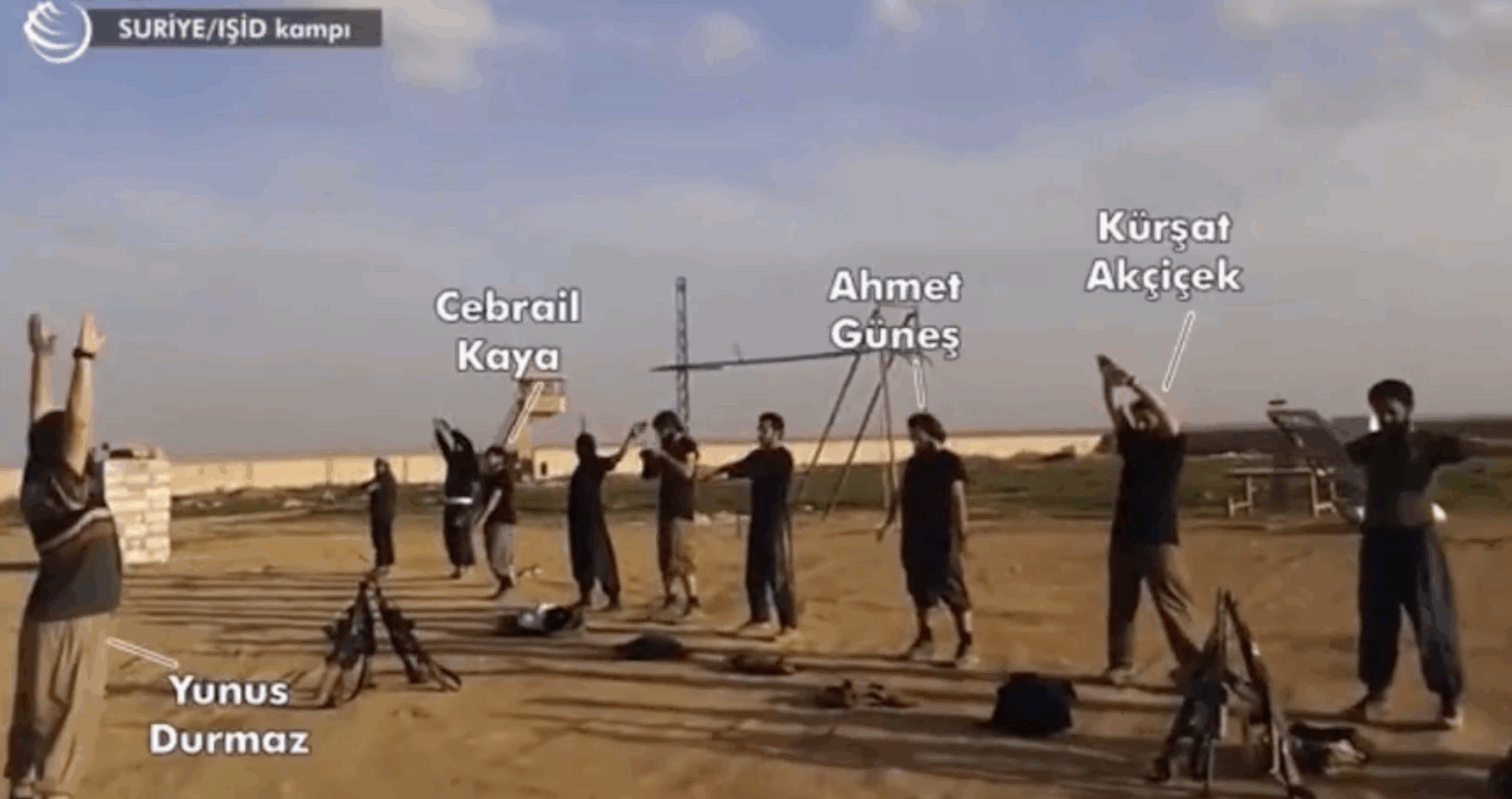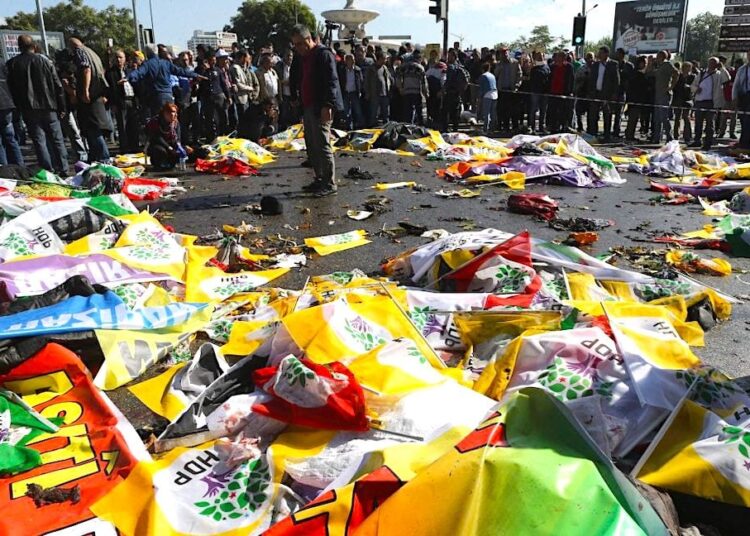Levent Kenez/Stockholm
Turkish Foreign Minister Hakan Fidan stayed silent during a tense parliamentary hearing on Tuesday as lawmakers questioned why Ankara has never taken any formal steps to secure the return of fugitive suspects in a bomb attack at an Ankara train station in 2015.
The lack of government action was made clear by Fidan’s refusal to speak even though he previously led the national intelligence agency during a period when documents and court files pointed to intelligence failures and involvement in the attack as well as contacts between intelligence officers and key figures from the Islamic State in Iraq and Syria (ISIS) linked to the attack.

The Ankara train station bombing occurred on October 10, 2015, during a large peace and labor rally organized by unions and pro-Kurdish associations. Two suicide attackers affiliated with ISIS detonated explosives in the middle of the crowd outside the central station. The explosion killed 103 people and wounded more than 400. It remains the deadliest terrorist attack on civilians in Turkey’s history.
The issue resurfaced during the foreign ministry’s budget hearing on November 18. An opposition lawmaker listed fugitives whose names appear repeatedly in the case file: Mustafa Delibaşlar, Fadile Delibailar, Cebrail Kaya, İlhami Balı and Bayram Yıldız. He said 16 ISIS suspects remain at large and that most of them are believed to be in Syria. He read aloud a statement asserting that the killers of the 103 people included 16 fugitives who had moved from territories held by the group.

Fidan did not respond. His silence drew attention because he served as director of the national intelligence agency at the time of the bombing and because his signature appears on a July 3 letter sent to parliament as an official answer to a written inquiry. The letter states that Turkey has not pursued extradition of the suspects and that the government instead relied on INTERPOL Red Notices without pushing Syria or Iraq for cooperation, an omission that raises serious questions about Ankara’s counterterrorism resolve.
Worse yet is that the letter confirms that Turkish officials knew the identities and locations of several fugitives in northern Syria but did not request their detention or extradition. Copies of this letter were reviewed by lawmakers and cited in subsequent judicial inquiries.
Court documents list 26 suspects tried in absentia in connection with the attack, 16 of whom remain at large. The fugitives are believed to be in areas administered by groups that once had operational links with actors inside Turkey. Materials in the case file show that Turkish authorities possessed detailed intelligence on their movements. A police memo submitted to the court states that at least five fugitives were located through field reporting and intercepts. Despite this information, no extradition request was filed.

The justice ministry received repeated questions from the court about progress, but each time the ministry responded that there were no developments. In a letter dated May 13 , 2025, the ministry advised the court not to seek further updates unless new information emerged.
The last hearing came shortly after the 10th anniversary of the bombing. On that date two lawmakers from the Labor (Emek) Party submitted written questions to the vice president. Their submissions referenced specific events documented in the case file and in police communications. They asked if intelligence personnel had met with key suspect Ilhami Bali in Ankara in 2016. They asked about clearance documents issued by intelligence officials for two ISIS members in 2014 that allowed them to continue their activities. They also questioned why digital materials belonging to ISIS commander Yunus Durmaz were sent to intelligence officials before prosecutors had reviewed them.

The indictment describes how the attackers traveled from Gaziantep to Ankara hours before the rally. Surveillance of the cell from Gaziantep stopped shortly before the attack, and police units that regularly conduct security checks at Ankara’s entrances before every event were removed. Families of the victims and several civil society groups later reported that police blocked memorial gatherings outside the station and that a blanket media ban was imposed within hours of the explosion.
Fugitives İlhami Balı, Mustafa Delibaşlar and Cebrail Kaya appear frequently in intelligence reporting. Images added to the case file in 2023 show them receiving training at ISIS camps in Syria near the Turkish border. Court records include testimony indicating that the location of these camps was known to security units. The same records state that their return to Turkey would be possible if authorities had submitted extradition requests.
Letter from Turkish Foreign Minister Hakan Fidan reveals that Turkey never sought the extradition of fugitive ISIS suspects behind the country’s deadliest terrorist attack:
A leaked police intelligence memo previously published by Nordic Monitor also states that Balı traveled to Ankara in May 2016 and stayed at a hotel in the Söğütözü district for three nights under the supervision of intelligence personnel. The memo lists the two officers who accompanied him and also states that he met with intelligence officers during the visit, details that appear in the court file. Another document shows that Balı received emergency medical treatment at a state hospital in central Turkey while arrest warrants were active.
After the attack the government announced frequent detentions of ISIS suspects, with security briefings referring to operations across several provinces. Court statistics show that few of these detentions resulted in convictions and that many suspects were released after initial questioning or during the trial proceedings. Despite the fact that lawmakers frequently asked how many convicted ISIS members remained in prison, the government did not release any credible numbers, citing security concerns.












